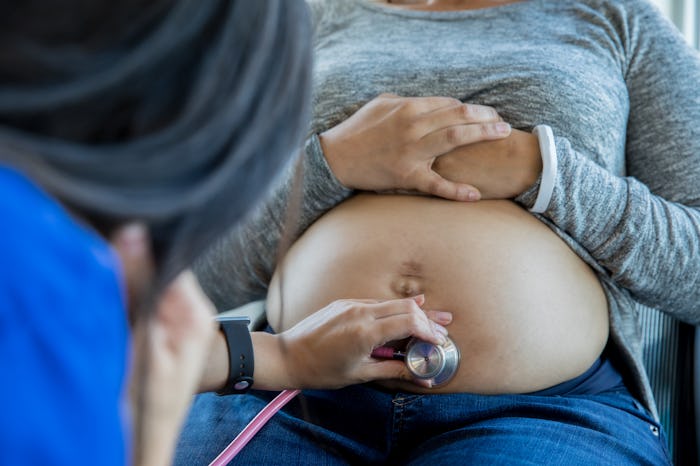News

Program "Rooted In Racial Justice" Will Pay Black, Pacific Islander Moms $1,000/Month
In an effort to end some of the wealth, health, and income disparities facing certain populations and improve maternal health and birthing outcomes, the city of San Francisco has launched a pilot program that will give pregnant Black and Pacific Islander women basic income. Under the Abundant Birth Project, approximately 150 women living in the city will receive a monthly stipend for a little over a year. The program, which is the first of its kind in the United States, aims to give mothers from particularly vulnerable groups the resources they need for healthy pregnancies and births.
"The Abundant Birth Project is rooted in racial justice and recognizes that Black and Pacific Islander mothers suffer disparate health impacts, in part because of the persistent wealth and income gap," San Francisco Mayor London Breed said in a press release announcing the program's launch. "Providing guaranteed income support to mothers during pregnancy is an innovative and equitable approach that will ease some of the financial stress that all too often keeps women from being able to put their health first,"
Fueled by research which has shown Black and Pacific Islander infants in San Francisco are more likely than white infants to be born prematurely at 13.8% and 10.4%, respectively compared to 7.3%, the Abundant Birth Project aims to serve as an economic and reproductive health intervention for Black and Pacific Islander mothers. Under the program approximately 150 Black and Pacific Islander women will receive $1,000 a month throughout the duration of their pregnancy and for the first six months of their baby's life for a total of $15,000. Eventually, the program hopes to provide the basic income supplement for up to two years post-pregnancy.
"Structural racism, which has left Black and Pacific Islander communities particularly exposed to COVID-19, also threatens the lives of Black and Pacific Islander mothers and babies," Dr. Zea Malawa, head of Expecting Justice, a collective impact initiative at the San Francisco Department of Public Health that will study the pilot program's health impacts, said in a statement. "Providing direct, unconditional cash aid is a restorative step that not only demonstrates trust in women to make the right choices for themselves and their families, but could also decrease the underlying stress of financial insecurity that may be contributing to the high rates of premature birth in these communities."
Malawa further applauded the pilot program as an attempt to "heal the wounds left by decades of injustice and anti-Black sentiment."
But there's good reason for San Francisco to work to reduce premature birth rates. According to the Mayo Clinic, being born prematurely can have short and long-term consequences for a child. In the short term premature babies can suffer from breathing, brain, blood, gastrointestinal, heart, and immune system problems. In the long term, however, they may experience cerebral palsy, dental problems, vision and hearing problems, chronic health issues such as infections or asthma, and impaired learning or learning disabilities. According to the Mayo Clinic, premature infants also have an increased risk of sudden infant death syndrome (SIDS).
According to 2012 to 2014 data from the San Francisco Department of Health, Black infants had an infant death rate four times higher than White or Asian infants and were disproportionately affected by SIDS deaths. On Monday, the mayor's office claimed Black families accounted for half of the city's maternal deaths and over 15% of infant deaths despite comprising only a small number — 4% — of all births. Pacific Islanders faced similar disparities.
"Thanks to the work of the many partners involved, we are taking real action to end these disparities and are empowering mothers with the resources they need to have healthy pregnancies and births," Breed said when announcing the city's new pilot program.